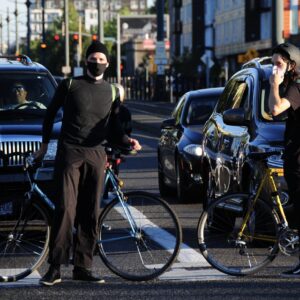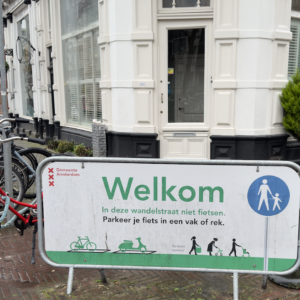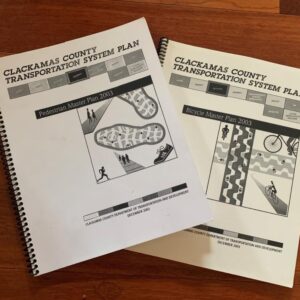
wonk on insurance.
Welcome to our Get Legal column. This is usually written by noted local bike lawyer Ray Thomas. But this time we’ve got one of Mr. Thomas’s co-workers Charley Gee filling in. Gee, an attorney at Swanson, Thomas, Coon & Newton is also an expert on how bicycles fit into the legal fine print. Today he’ll unravel confusion that often exists around insurance. Specifically, how auto insurance policies impacts those of us who don’t drive much (or at all).
Q. I have an Oregon automobile insurance policy. What does that mean?
A. In Oregon, every automobile insurance policy has four areas of coverage: Liability, Personal Injury Protection (PIP), Property Damage, and Uninsured/Underinsured Motorist Coverage (UM/UIM).
Q. What is PIP?
A. PIP covers medical expenses and lost wages if you are injured in a collision. In Oregon, the minimum amount of coverage is $15,000. PIP is (usually) “first party” coverage which means your automobile insurance covers your medical bills and wage loss despite the collision being the fault of another road user.
Q. I ride a bicycle and walk places sometimes, do I need to buy an additional insurance policy that covers me when I ride?
A. It depends. In Oregon, your automobile insurance will cover you in some ways when you are walking or riding your bicycle. If you are injured in a collision with a motor vehicle, your PIP insurance will pay your medical bills. However, if you are injured in an accident that does not involve a motor vehicle, PIP will not cover you, but your health insurance would. If you hit and injure a pedestrian or another bicyclist while you are riding your bicycle, your automobile liability insurance will not apply. There are other insurance options available to cover your liability, such as homeowners/renters insurance or personal liability umbrella policies.
Q. I usually walk or ride my bicycle for transportation. I don’t own a car. Can I get insurance?
A. Yes, so long as you’re a licensed driver. Some national insurers offer insurance for drivers who don’t own their own cars. These policies usually need to be purchased through a broker or local agent, though. This coverage is very affordable and offer the same protection.
Q. Do I still need a big policy if I mostly walk or ride my bicycle?
A. Yes. It is just as important (if not more so) to have adequate insurance when you are riding your bicycle. In Oregon the amount of your UM/UIM insurance is the same as your liability insurance. Therefore higher limits means more protection for you as well as any other road user you may injure.
Advertisement
Q. Will my automobile policy cover my bicycle if it is stolen?
A. No. However, your homeowners/renters insurance policy might cover the loss.
Q. I was hit by a car while riding my bicycle and had to go to the hospital, how do I pay the bills? I have automobile insurance and health insurance.
A. Since you have your own automobile insurance, your PIP coverage will become the “primary” insurer to pay the bills. Any bills not covered by your automobile insurance will be paid by your health insurance. Additionally, any bill not paid by either of your insurers, like co-pays, can be submitted to the motor vehicle driver’s PIP insurer. Your insurers will then seek repayment from the negligent driver’s insurer in a process called subrogation.
Q. I was hit by a car by a car while I was walking. I had to go to the hospital. How do I pay the bills? I don’t have automobile insurance or health insurance.
A. In Oregon, pedestrians (and that includes bicycle riders in the context), can access the PIP coverage of a motor vehicle that hit them, regardless of whose fault the collision was. As a result, if you are struck and injured by a motor vehicle while walking, your medical bills and wage loss will be covered as if you had automobile insurance yourself.
Q. I was hit by a car while walking and injured. Now I can’t work. How do I recover my lost wages?
A. Your lost wages will be paid by PIP coverage, but not 100%. First, you have to be unable to work for two weeks. Even then you will receive only 70% of your gross pay up to $3,000 a month. The other portions of wage loss not covered will need to be recovered from the driver’s insurance company through a settlement or trial.
Q. I was hit by a car while riding my bicycle and my bicycle was damaged. How do I get it repaired?
A. Your property damage is covered under the automobile insurance policy of the car that hit you. Once you have a claim open with the insurer, take your damaged bicycle to a bicycle shop for a damage estimate. The damage estimate will need to contain the cost of repairing the bicycle. If the bicycle is a total loss the shop should provide you with the value of the bicycle, as a used bicycle with the components it had, at the moment before it was hit and its value now.
Q. I was hit by a car while walking and I don’t think I was hurt. Should I still file a claim with the driver’s insurance company?
A. Yes. First, sometimes injuries can stay “hidden” for several months. Second, by reporting a driver that hit you to their insurer, you are ensuring some repercussion (higher insurance rates) for their negligent driving.
Q. I was hit by a car while riding my bicycle and the driver did not have insurance. What can I do? I have automobile insurance.
A. Your insurance policy contains UM/UIM coverage which will cover you if you are hit by an uninsured or underinsured (damages exceed their policy) driver. Your insurer essentially steps into the shoes of the negligent’s driver’s insurance (if they had any).
Q. I was hit by a car while riding my bicycle and the driver did not have insurance. What can I do? I do not have automobile insurance.
A. First, file a police report. If you have medical insurance, that coverage will pay your medical bills. If you do not have medical insurance then you may need to find a treating doctor that will accept payments or treat you for a reduced charge. If the uninsured driver struck you while engaged in a crime (assault, driving under the influence) then you may be able to obtain compensation from the Oregon Crime Victim’s Fund.
Thanks Charley! And by the way folks, he’ll be watching the comment section for your questions and feedback.
This article is part of our monthly legal series sponsored by Swanson, Thomas, Coon & Newton.







Thanks for reading.
BikePortland has served this community with independent community journalism since 2005. We rely on subscriptions from readers like you to survive. Your financial support is vital in keeping this valuable resource alive and well.
Please subscribe today to strengthen and expand our work.
Non-Named Owner Policies (for those of us who drive occasionally, but don’t own a car) are relatively affordable, but they aren’t at all cheap. I pay ~450 a year to cover myself and my mate. 90% of the time I drive I am covered by ZipCar, Car2Go, or GetAround, but I keep the policy for uninsured motorist coverage and for when I rent a car. Renting a car for about 2 weeks a year out of town balances out the insurance policy, pretty well.
That said, I really wish a company like MetroMile would offer me pay as I go Non-Named Owner insurance. I suspect I could save 300 a year or more on my insurance if I could pay non-car rental rates for the two weeks I need it.
Mind sharing what company you purchased your NNOP policy through? I am looking to find coverage in the case I am in another collision on my bike, but also for those times when I drive a friend’s car or rent one and don’t want to pay 3x the rental price in insurance add-ons.
I was in a relatively minor collision with an auto last year that resulted in some bike damage and a shoulder injury. I don’t own a car but have medical insurance. Fortunately, the driver stopped, had insurance, and I had two witnesses. Unfortunately, my not owning a car (and thus having no car insurance) made the billing process for my doctor and PT visits a real hassle. The forms at the doctor’s office didn’t even provide for a circumstance in which I wouldn’t own a car/have auto insurance. Lot’s of billing confusion ensued. Furthermore, I didn’t have the benefit of my insurance advocating on my behalf should the driver or his insurer have disputed fault. Again, lucky for me he took full responsibility.
We have State Farm through our agent Dan Lucich. I have heard, through him, that you need a pretty clean record to get these policies, but hopefully that’s not an issue for you.
Nope, spotless driving record. 🙂 Thanks, Tony. I used to have Dan for my renter’s insurance before I bought my home, so I have his contact info.
The problem (in my view at least) with Car2Go’s and Zipcar’s insurance is that the insurance they offer is the bare bones minimum required in Oregon. I think it’s prudent to carry an individual policy that provides coverage well above and beyond the minimum, which is $25,000 in Oregon, for your own protection and the protection of other roadway users.
I drive fewer than 10,000 miles a year, most of which are in summer for camping. I wish Metromile or a similar company would offer higher coverage rates based on mile traveled but they don’t, or at least they didn’t last time I checked.
…how about us BP readers in SW WA…or Portlanders riding north of the border for work commute or recreation? Any additional info on WA law?
Todd, I don’t practice in Washington so I am not that familiar with Washington law. Cynthia Newton in our office does, though.
There’s a time limit for settling a claim. I believe it’s 3 yrs. in OR and 2 yrs. in WA (It’s been over 10 yrs. since my last claim, so if the law’s changed or if I’ve got the time limits reversed, someone please correct me). If you can’t get the motorist’s insurer to settle & don’t sue within the allowed time, you’re out of luck.
Don’t wait until the last minute. If trying to settle for damages & medical expenses, most insurers are pretty quick to deal with property damage, and in both cases where I had significant property $ the insurers quickly settled for REPLACEMENT cost. I buy almost all bike stuff, including clothing, parts & accessories, on my credit card and KEEP the receipts. That’s helped me get replacement jerseys, tights, a jacket, a new rack trunk bag, helmets etc.
I’ve usually tried to settle for medical expenses without involving lawyers, but some insurers will drag medical expense settlement out forever based on the premise that if they deny, deny, deny the claimant will either exceed the time limit or give in and accept a meager settlement. If you catch any hint of foot-dragging, FIND A LAWYER, preferably the meanest, orneriest one you can locate!! Make ’em pay big-time. This is not just for your sake, it’s for ALL of us. The more it costs motorists and their insurers for their carelessness and negligence, the better the chance they’ll start taking cyclists and pedestrians seriously and start treating us as equals instead of 2nd class users of public property. The usual settlement for medical expenses + “pain & suffering” is 3 to 3.5 x actual medical costs – don’t forget to include ambulance costs and office visits for aftercare, etc. Loss of income should be in addition. If you suffer permanent injury or impairment, then the settlement should be much higher.
I believe the PIP minimum in WA is $25,000, not the OR $15,000 minimum. In any event, neither minimum is adequate in the case of any significant injury. Ray Thomas recommends buying additional PIP coverage as the cost is quite low. I’ve increased mine to $35,000 and found out the hard way that it’s a bargain. Some precautionary notes about dealing with PIP:
(1) TRAP!! As noted by Charley Gee, coverage comes FIRST from your own PIP, and only after your PIP is exhausted do expenses bill directly to the motorist’s PIP. Your insurer will subrogate its payments to the motorist’s insurer. Before accepting any settlement make sure that your insurer has subrogated all of its expenditures to the motorist’s insurer. ANY THAT HAVE NOT YET BEEN SUBROGATED WILL BE DEDUCTED FROM YOUR SETTLEMENT AND RETURNED TO YOUR INSURER. In one case, if I hadn’t caught this it would have cost me $2,000!
(2) Even dealing with your own insurer can be troublesome. As with many insurers, mine delayed payment on hospital bills. It reached the point where the hospital was dunning me for payment. That is annoying and hurts my credit rating. I called my insurer and said something like: “This is a legitimate medical expense. All you’re doing is surrogating anyway, not much more than an accounting entry. PAY THE #%@*&% BILL.” The point here is that you have paid for this insurance coverage, and there is no need to be bashful about demanding the coverage you’ve paid for.
For significant injuries, given the complexities of dealing with medical, legal and insurance issues, I think a good case can be made for contacting an attorney early in the process.
Just an aside: I know I’m only a sample of one, but I have over 100,000 cycling miles under my belt. About 1/2 of these are south of the river, and the other 1/2 are in Clark County. In spite of this, ALL of the significant injuries I’ve suffered have been in Portland. This in spite of the fact that most Portland motorists are courteous to a fault. I think this is because traffic DENSITY is so much higher in Portland, making the likelihood of mistake and mishap much higher. If one does the math the likelihood of a crash increases not in linear proportion to the # of users, but exponentially, roughly as the square of the # of users. This does not bode well for the long-term effectiveness of on-street modifications such as bike boxes, bike lanes, etc. They quickly become overwhelmed by the ever-increasing # of users.
Regards.
The statute of limitations in Oregon is 2 years.
In all of the above examples (not just the last one), isn’t it advisable to file a collision report with ODOT, regardless of whether the police were called to the scene?
When I was hit on my bike by a car, the other party’s insurance required a government collision report number (they didn’t haggle and paid the full claim, thank goodness).
Good point Craig. I didn’t address that in this article because it isn’t really insurance related, though in your case it was.
Oregon law requires a person who is involved in a collision that results in property damage over $1,500 or where someone is injured or killed to file a Form 735-32 Accident Report. I am going to write a Q&A later that addresses the steps a person must take when they are involved in a collision.
is your UM/UIM triggered if you are the victim of hit & run? I’m assuming yes but wasn’t sure.
Absolutely. It is actually called a “phantom vehicle” claim in the legal world and sometimes results from an unidentified vehicle causing a collision or a crash without contact being made.
Charley, you’re a delight! Swell article. (and BikePortland forgot to mention that you have been serving as Umbrella Board President for the past x years. WNBR riders around Portland … umm … salute you?)
Thanks Steph!
This is really helpful … especially the part about hit & run. When I got hit while riding 4 years ago (vehicle at fault, ironically none of the 8 or so witnesses got the license plate), my State Farm agent told me that I did not have any applicable coverage for either my injuries OR damage to my bike. Luckily both were fairly minor, but now he and I are going to have a little “come to Jesus” meeting. The explanation was that riding a bike in the roadway was the same as being a pedestrian on the sidewalk. Total BS!
I was struck by a TriMet bus while riding my bike just yesterday afternoon, and sustained an injury to my shoulder and damage to my bicycle. The driver was aware that he had hit me, told me that I was fine, and chose to leave the scene of the accident. I’m not sure how to handle this situation. I have enough information to identify the driver and the bus that hit me, but after contacting TriMet, I feel like they’re just going to sweep this under the rug in typical TriMet fashion. Any suggestions?
Erick, Given that it was Trimet I would talk to an attorney about the collision. They have a claim system that is different than insurance companies.
If I’m reading this article right, since I have neither a driver’s license nor a car there’s no way for me to be an insured bicyclist.
Angel, I think that’s correct, in so far as auto insurance is concerned. One condition of obtaining auto insurance is having a valid driver’s license.